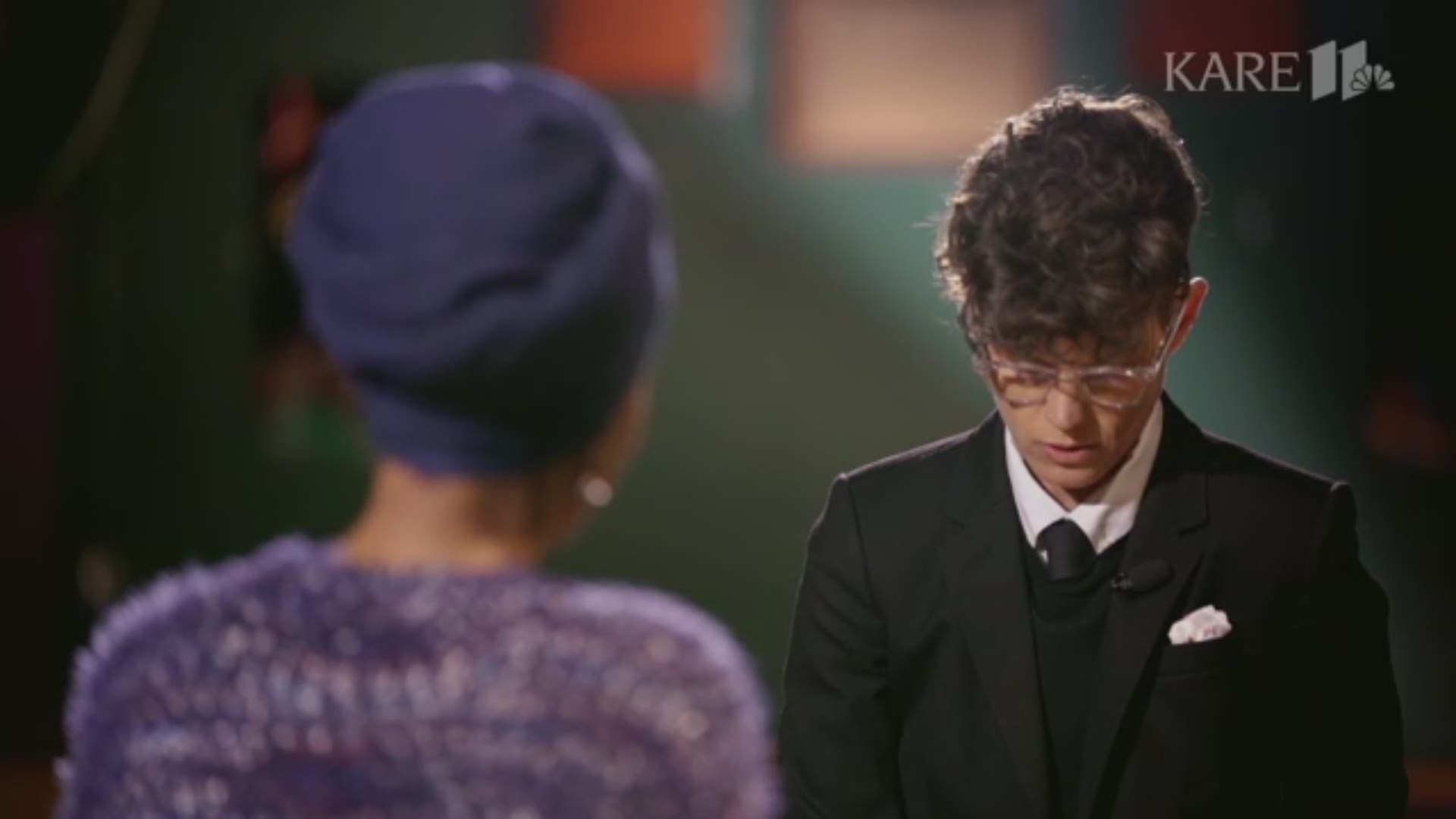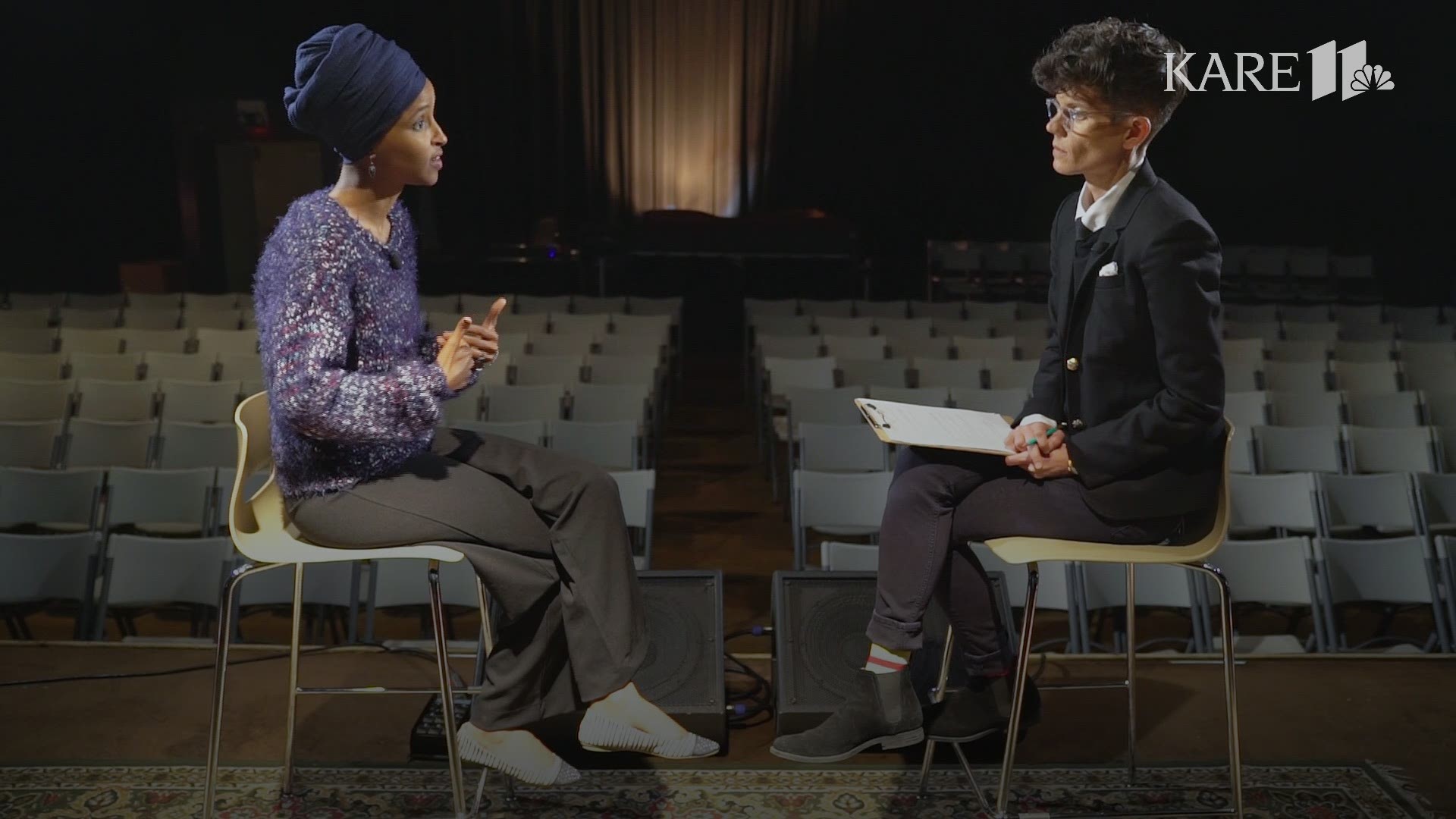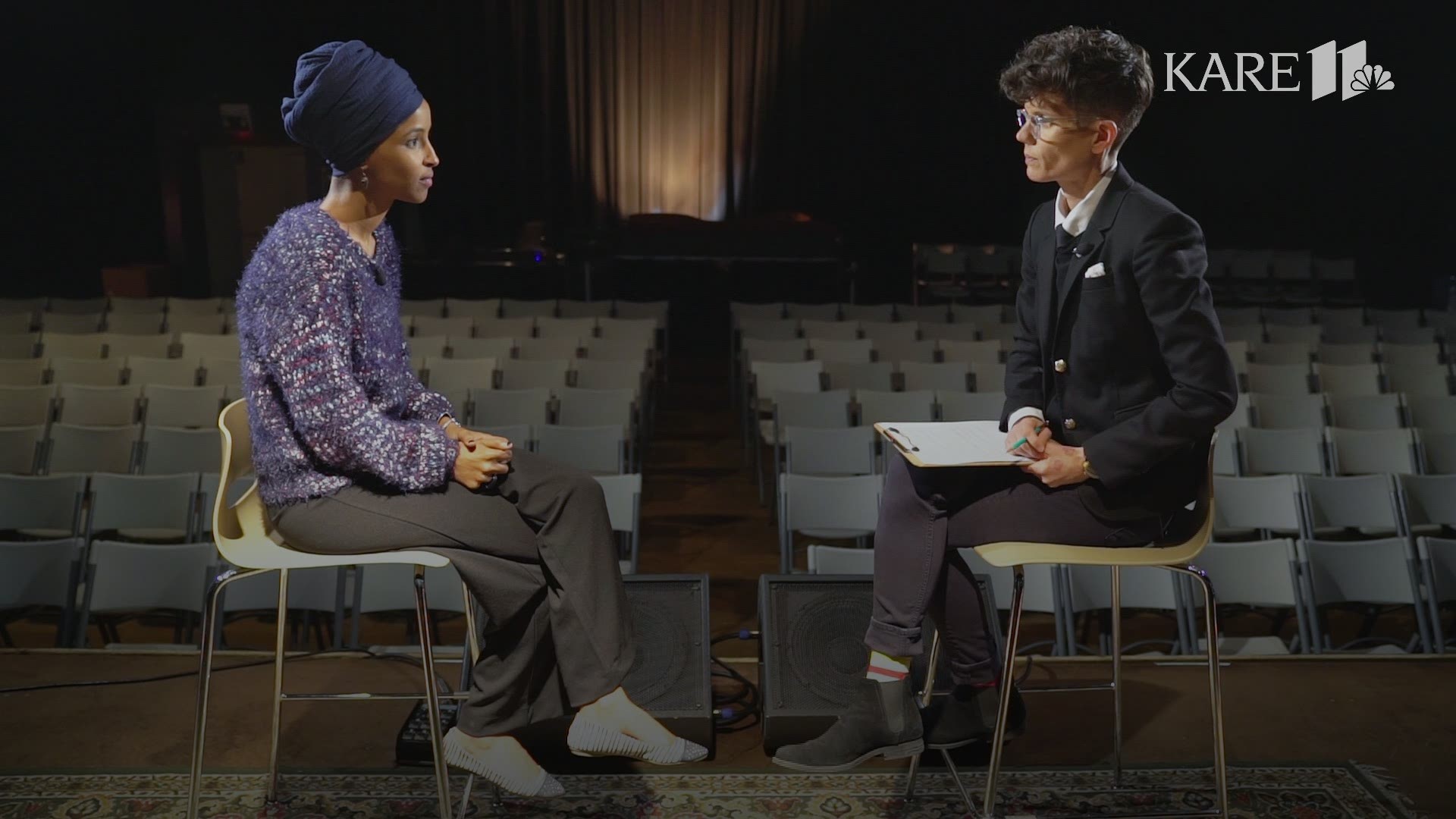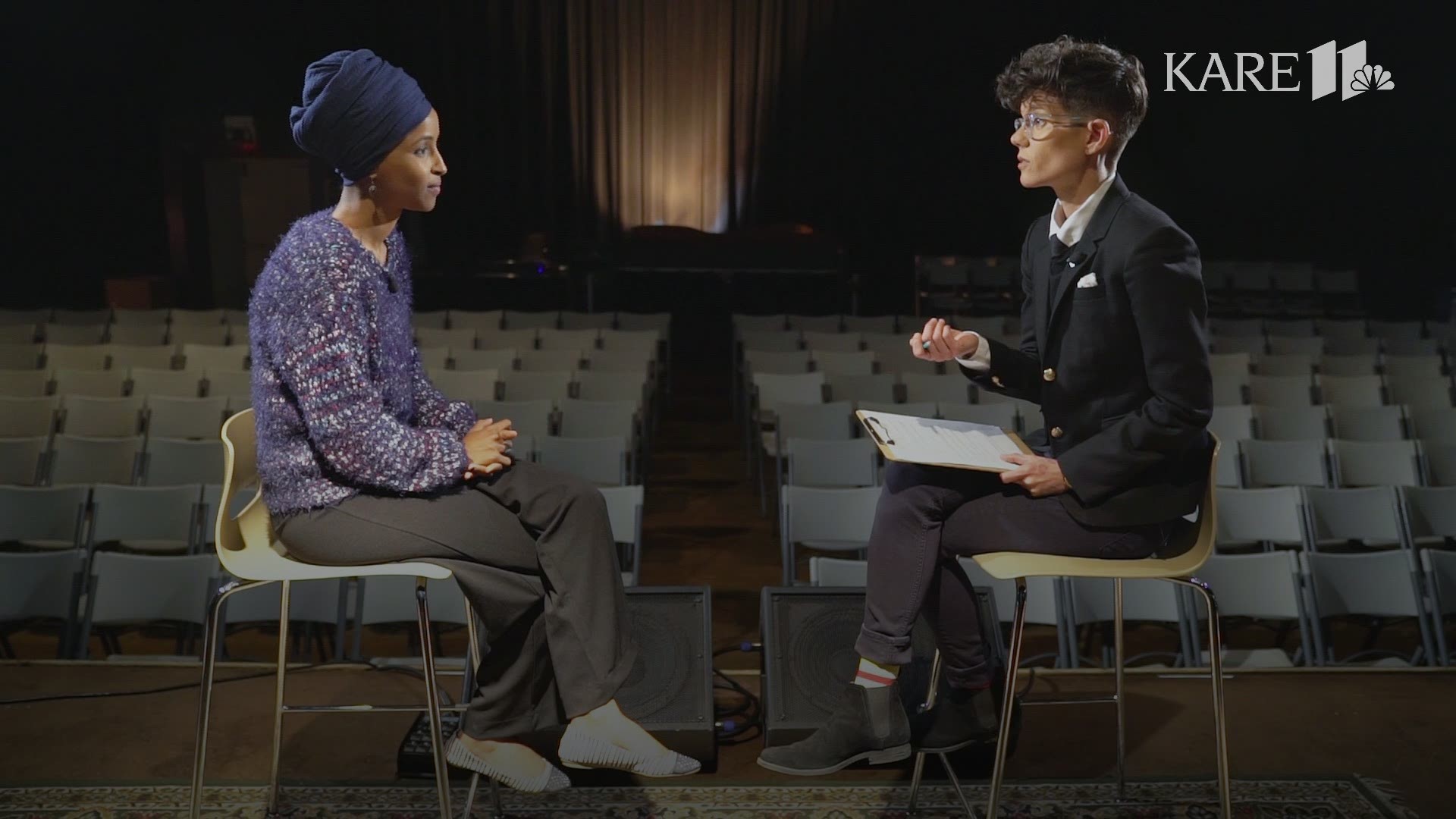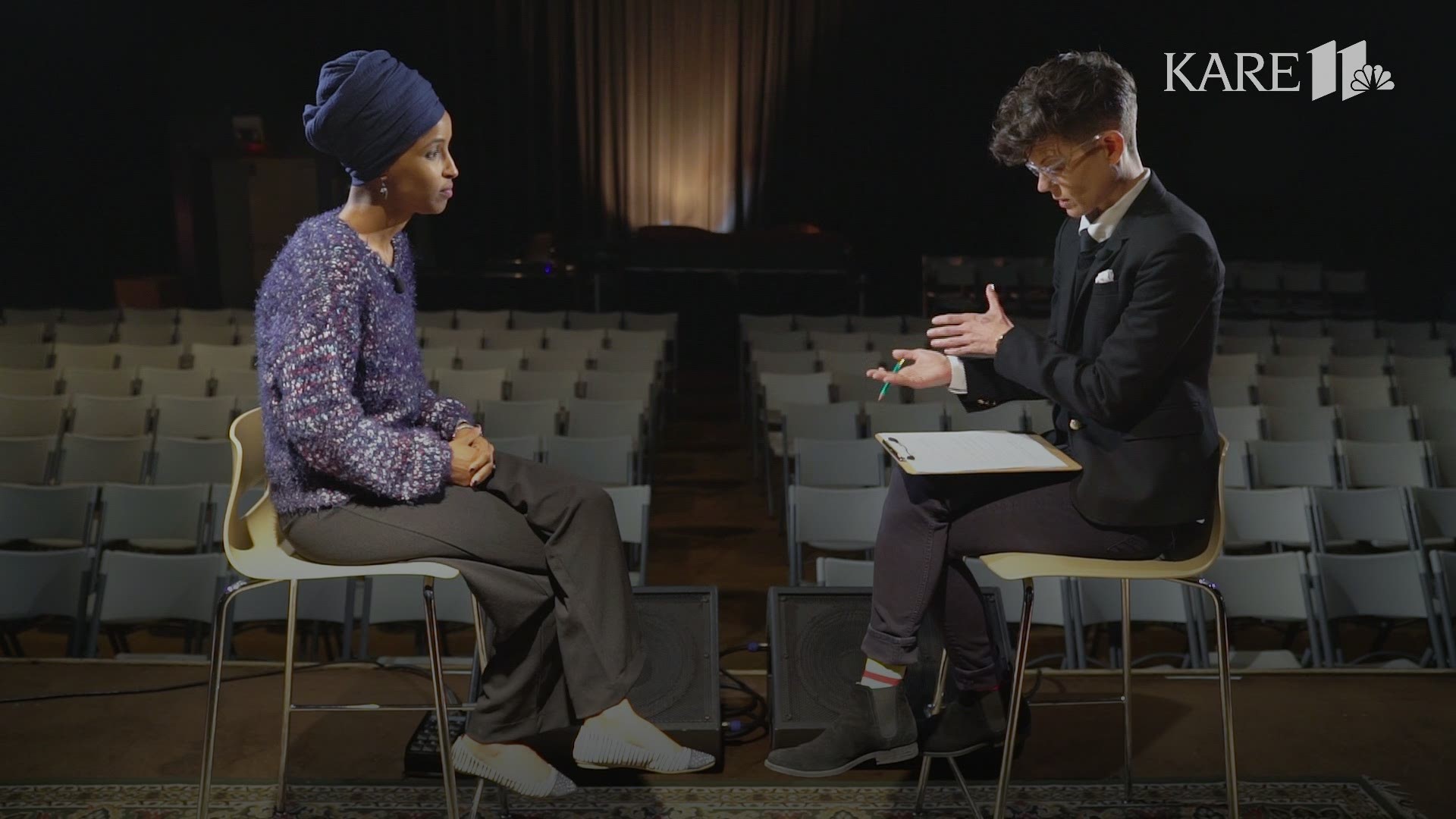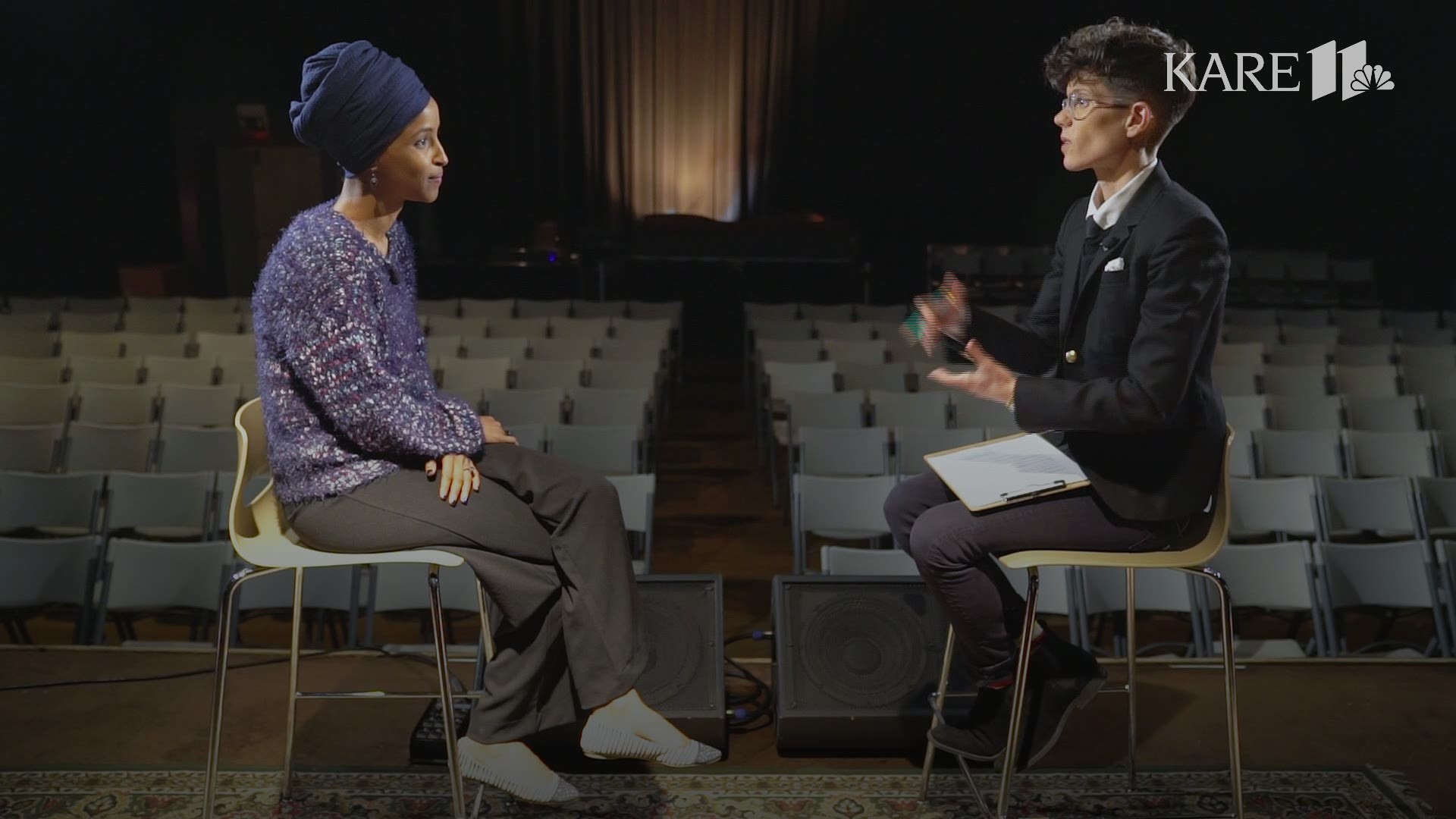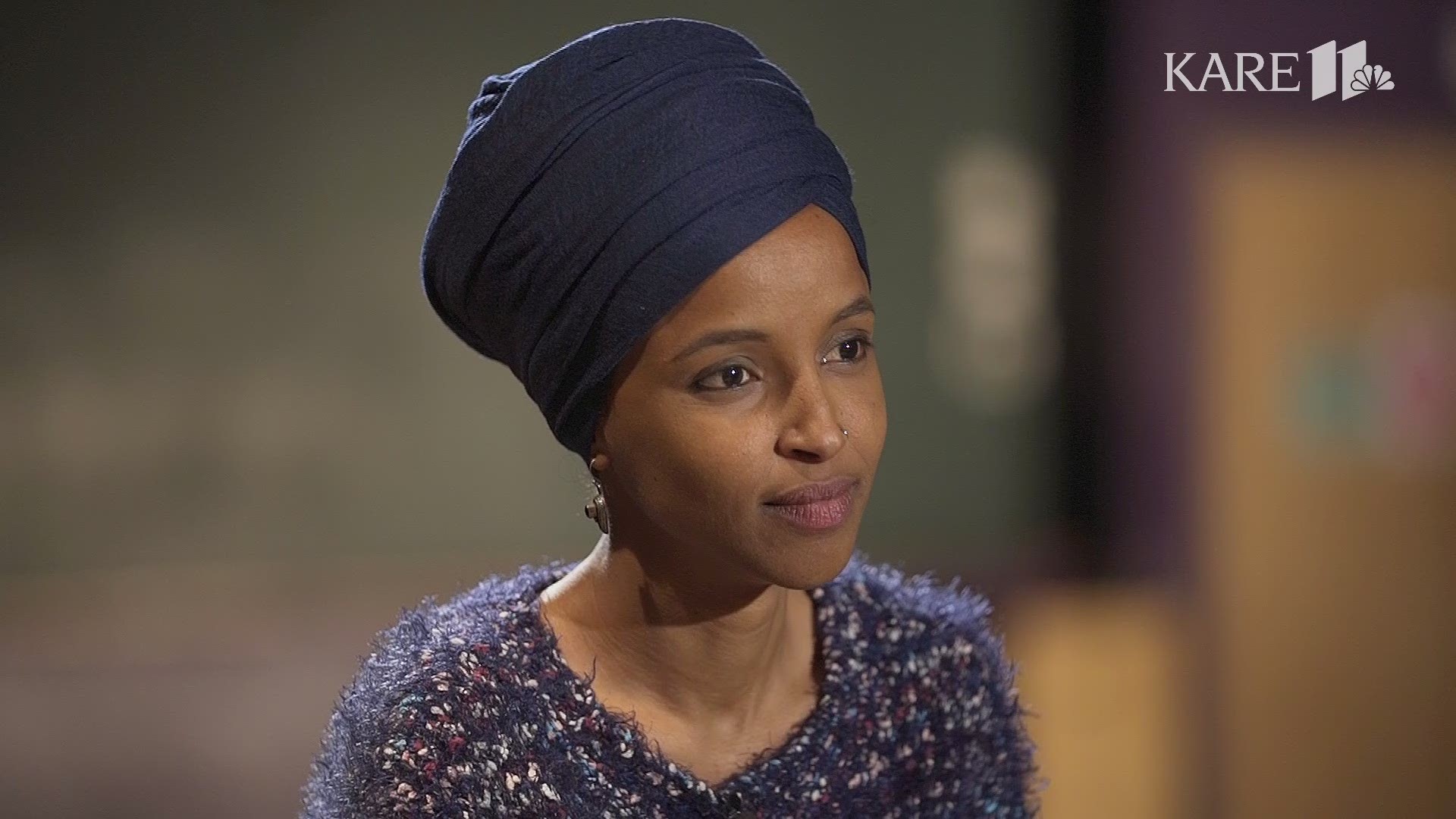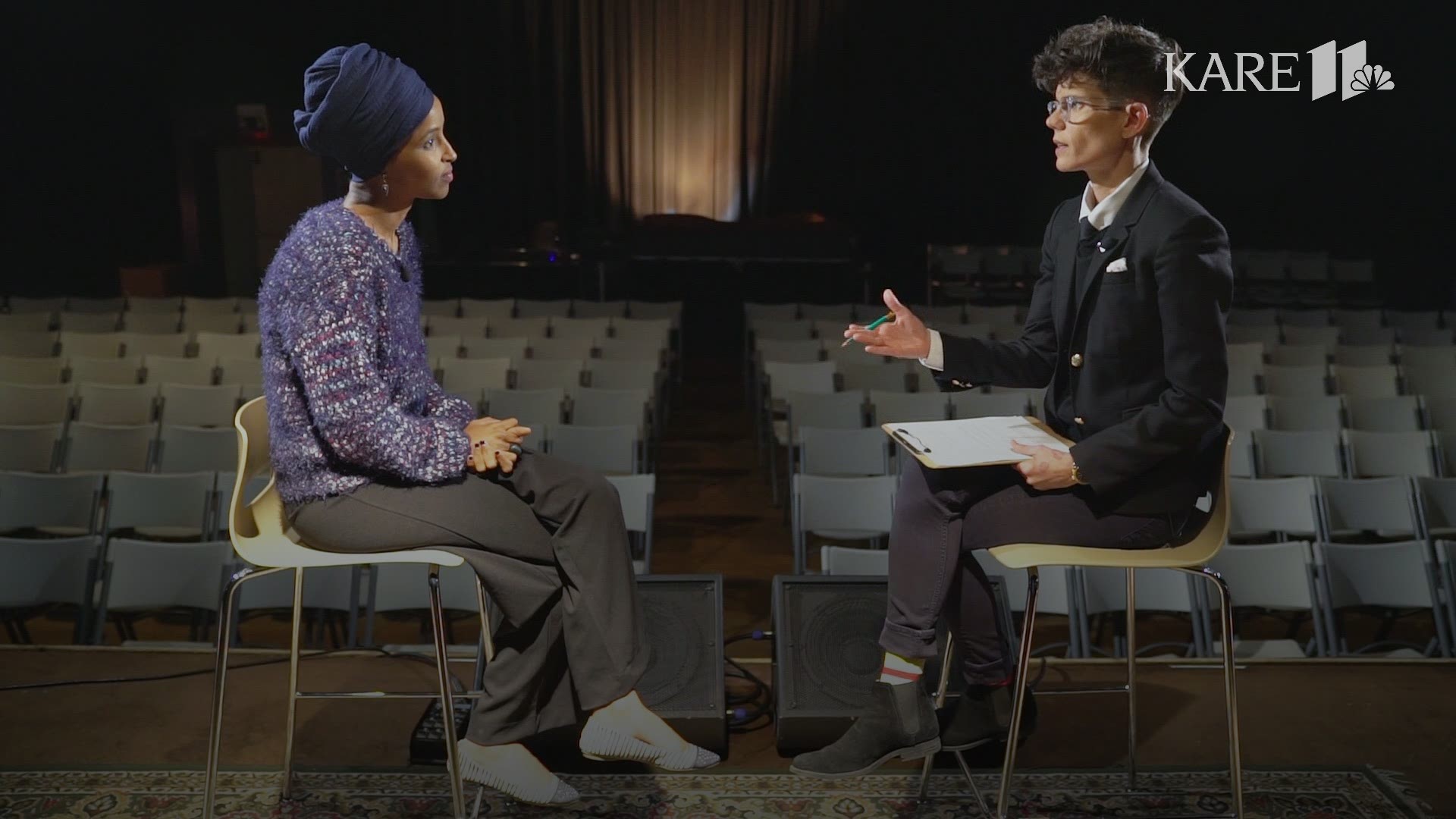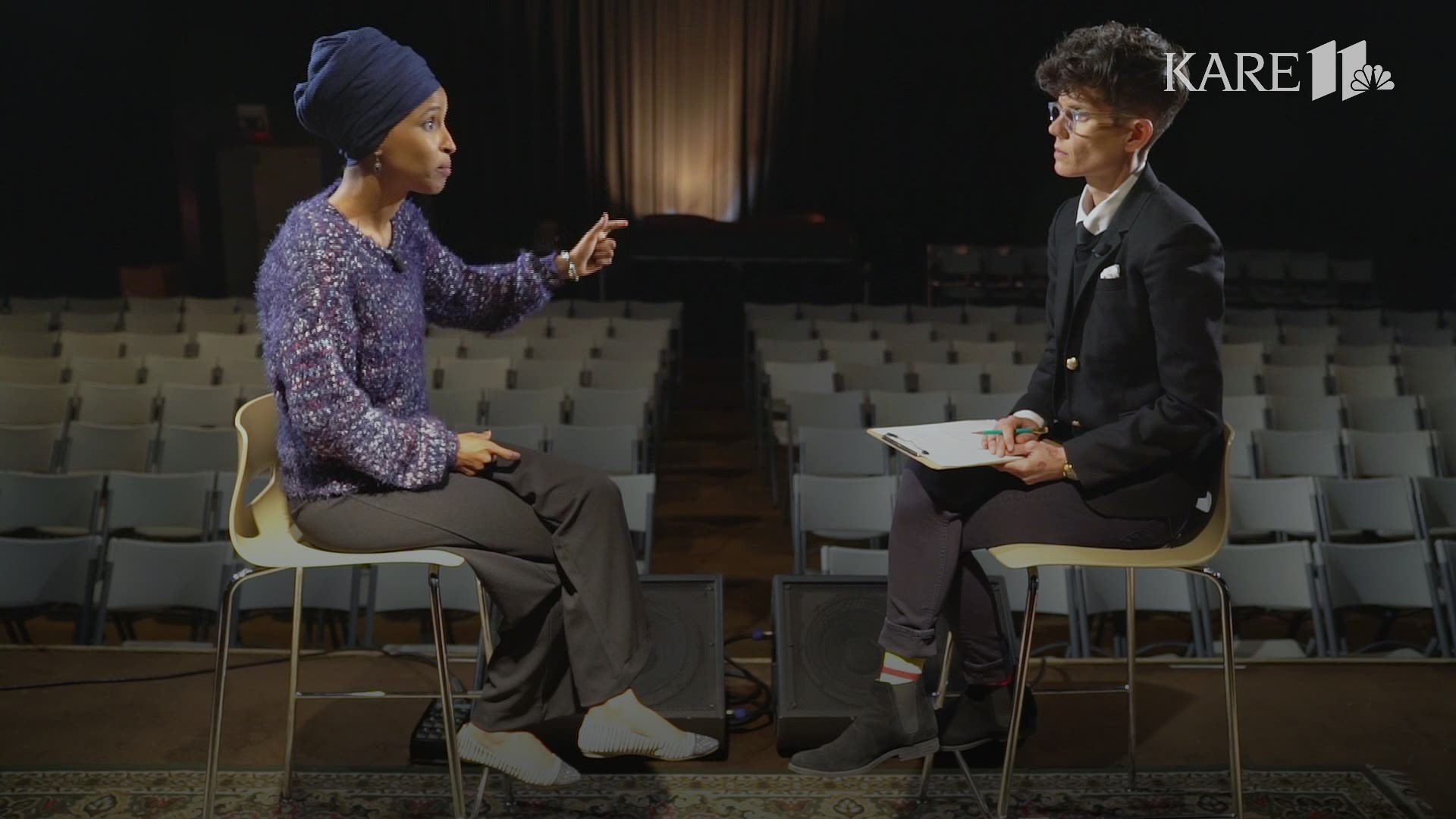MINNEAPOLIS — Rep. Ilhan Omar has stayed in the national and international spotlight consistently in recent months, with intense controversy stirred up by some of her comments.
The Minnesota congresswoman faced blowback for suggesting on Twitter that U.S. support for Israel in the struggle with Palestinians is "all about the Benjamins.”
She faced more for remarks about 9/11 that included the words “some people did something.”
Omar has also faced death threats, from being included on the hit list of an accused “domestic terrorist” to being threatened in the form of graffiti at a Holiday gas station.
Thursday, Omar sat down one-on-one with KARE 11’s Jana Shortal, to answer some of the tough questions the world has been wanting to ask her.
9/11:
Shortal: You are speaking at a fundraiser for CAIR, describing the 9/11 terrorist attack that killed 2,977 people and you said “some people did something.” What did you mean?
Omar: You’ll see oftentimes that a horrific event like 9/11 would happen where a few awful terrorists attack us, attack any nation and then people like the president and others will use that incident to paint a whole faith as being awful. And so in my speech I was talking about how our civil liberties as Muslims was being eroded after the horrific attacks of 9/11. And for people to suggest that I do not have an ability to understand, I mean I was 18 years old when that happened. I was in a classroom in college and I remember rushing home after being dismissed and getting home and seeing my father in complete horror as he sat in front of that TV and I remember just feeling like the world was ending. And that’s not a feeling that I had, that’s a feeling every single person who can comprehend any sense of pain felt. And for many Muslims in this country, as we looked to our neighbors for comfort and to also comfort them, we were also now being treated as suspects. And so that is the conversation I was talking about. I think for many Muslims the conversation about our treatment as a second-class citizens in the ways we have been surveilled and they ways that we have been demonized, has not really been one that we have been able to have publicly and I wouldn’t really be doing justice for the position of influence that I am in if I don’t ignite a conversation that is about what goes wrong in a society when we decide to vilify a whole faith, a whole group of people. Every country that witnesses anything like that has always had the ability to have that conversation and separate the terrorists from the people who might share a faith with them, or might share a culture with them and it is an important conversation for us to have here.
Shortal: Some people are offended by those four words. They suggest that you were not describing that day accurately, as they were just some people. What would you say to that?
Omar: I mean people are offended by everything I say. Right? I think that there is a particular bias and a particular lens that people sort of critique the words that I use and that is not a bias and a lens I could get rid of with one answer or with one conversation. I think people will have an opportunity to critique and all I ask for them is to give me, I think, the kind of critiques that they would give anybody.
Shortal: The way that you just described 9/11 and your experience with it suggests to me that it is more to you than “some people did something.” It was a big deal.
Omar: Yeah, I mean to some people it’s easy for them to not think of me as an American, as someone who would have the same exact feelings as they did as we were being attacked on American soil.
Shortal: And you did have the same feelings?
Omar: I did. And that is really the essence of the conversation I was having. We did have. We felt the attack. We were attacked. And in return we were treated and continue to be treated as suspects, and it’s not OK. And it’s about time we say it’s not OK.
Shortal: How do you feel about the events of 9/11?
Omar: The events of 9/11 were life-changing, life-altering for all of us. I mean, this was I think one of the most horrific terrorist attacks that we have lived through. I mean, at least for me. And I think to this day, many of us could not imagine how something like that could take place on American soil. And many of us recognized that the work that we needed to do in making sure that terrorist attacks like that don't happen. And so my feeling around it is one of complete horror. It's one that, like I said, in a second I can go back to that feeling, not just of me, but of my father, and really understand how none of us are ever going to forget that day and the trauma that we will always have to live with. And how, I think, the lives that all of us would have led have been altered, because of that single act of horrific violence towards us.
Shortal: You said "we" and "us" several times in that answer. Who are "we" and "us?”
Omar: "We" is the American people, and "us" is the American people.
'IT'S ALL ABOUT THE BENJAMINS':
Shortal: On February 10 you responded to a tweet with the words, "It's all about the Benjamins baby." Do you regret that tweet?
Omar: Regret is a strange word. I think you know, money really is in the center of our politics. We prioritize the needs of the special interests and we often forget that the people who we should be serving are the ones who get us elected. Each one of us in Congress or in any body represents a collective voice of constituents and I feel like in the actual makeup of political power they get to be treated as the least powerful because they don’t have the resources to be advocating for themselves. So my mission really is to make sure that the people recognize that they have power and that moneyed interests have less.
Shortal: Specific to the tweet though, it upset many Jewish Americans, many Jews around the world, and a lot of Jews in the 5th district. What do you say to them?
Omar: That for me is the regrettable part. And what is regrettable about that for me is that sometimes you could be so blinded to how certain words could stir up feelings of pain for people. I was in conversations with Congressman Keith Ellison and he was describing all these words that hold so much negative feelings for, that stir up negative feelings for the African American community. And I said, “None of those things really would ever make me feel any sort of way.” And he said, “Well you’re an African immigrant.” And so often times you’ll hear people say, "As a Jewish person I’m not hurt by Ilhan’s words," and then you’ll hear people say, "As a Jewish person I’m hurt by Ilhan’s words." And that is true because we all have our own ways of interpreting words and we have our own biases that sometimes help us navigate the world. And I’ve never really imagined myself walking into a situation where anything that I would do or any words that I would say would stir up hate for anyone.
Shortal: You apologized for that tweet.
Omar: I did.
Shortal: Do you still believe in your apology? Would you apologize again today?
Omar: I would. I think anytime somebody stops you and says, "What you did or what you said has hurt my feelings," I think you are not a good human if you do not pause and take that in and recalculate it in your head and reach a conclusion that tells you that you should apologize for those feelings that you hurt. You could re-assert, right, whatever point you were trying to make in that conversation, but you cannot not acknowledge the pain that people might feel.
ANTI-SEMITISM:
Shortal: Are you anti-Semitic?
Omar: Absolutely not. I have always believed that it is important for those of us who really are marginalized in all of our societies to recognize there are people who benefit from division. Everybody wants to pit us against one another in order to maintain power. So it is easy for people to say, “Look over here,” and that’s what the people like this president and many of the leaders within the Republican party are doing. There is a rise in hate in this country, and that's coming from white supremists.
DEATH THREATS:
Shortal: After that becomes a thing (Trump's response to Omar's 9/11 comments), and it goes viral on Twitter, the hate seemed to increase, did it not?
Omar: I mean... yes.
Shortal: Death threats?
Omar: Yeah, I mean, prior to that I was on a hit list, on someone who was arrested. Before that also, I think just that same week, there was a man who was arrested in New York for wanting to blow my brains out. And so it's not that they are increasing, it's that they're being amplified, and now directly being incited by the commander-in-chief of this country.
ON HOW SHE'S PERCEIVED:
Shortal: Some people love you, some people hate you. What does that feel like?
Omar: Okay.
Shortal: Why okay?
Omar: I mean that's life - you can't appease everyone. It's really strange to think that you want everybody to love you. Or that you accept everyone to hate you. I think the best that you can do is to strive for people to have respect for you - that's all I want.
FIRST MONTHS IN CONGRESS:
Shortal: Do you feel like all of this controversy and all the attention – even the good attention (Maroon 5 videos) - has taken away from the work you want to do for the 5th district?
Omar: It has not. From my first day showing up to Congress, I have truly focused on doing the work in moving the people's agenda.
HER "SISTERS" IN CONGRESS:
Omar: For my colleagues who have showed up to Congress with the urgency to make change – I think about my sisters Alexandra, Rashida, Ayanna – all of us know that the agenda that we have in ending in homelessness or pushing for the Green New Deal or creating a federal jobs guarantee program or canceling out student debt – these are the kind of policies that the majority of this country believes in. And so, not only are we being attacked because of the identities we represent, but we're also being attacked because we are championing policies that really resonate with the American people and that is the bigger threat.

